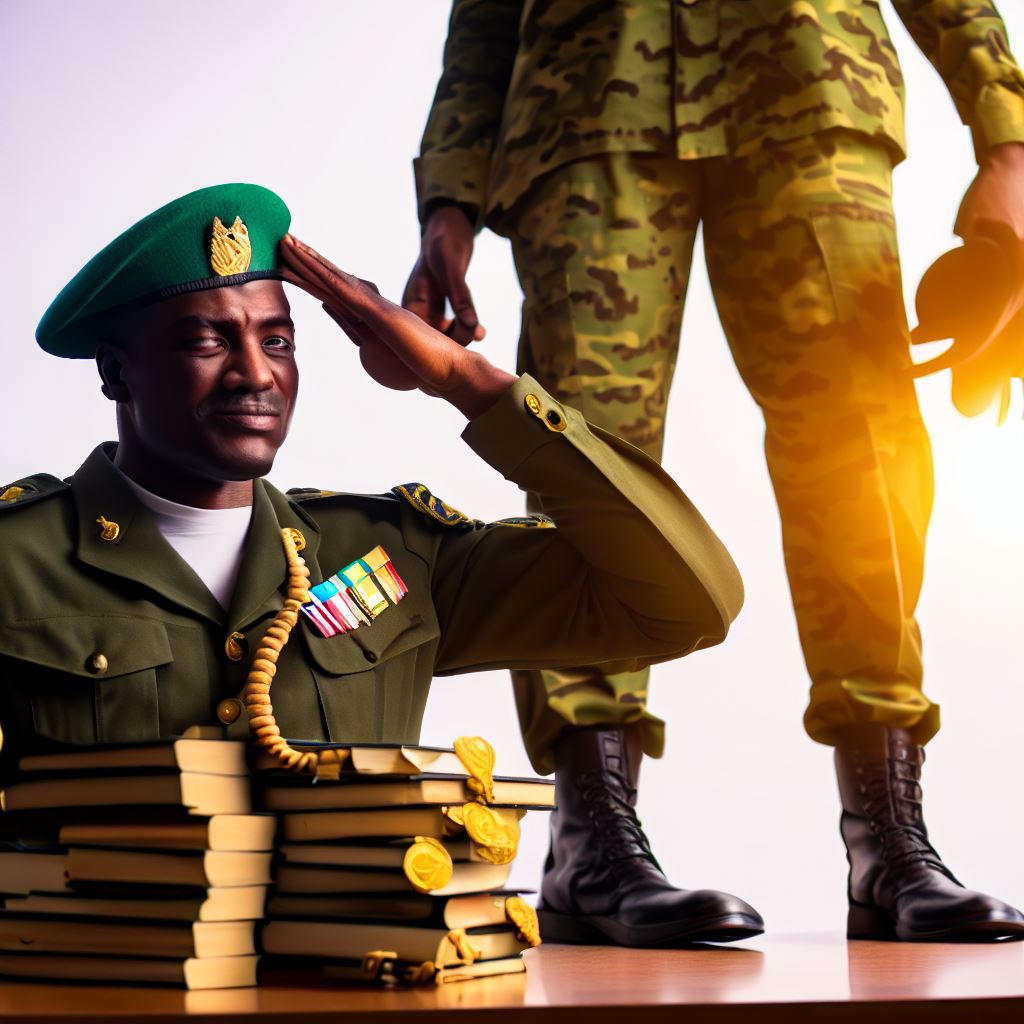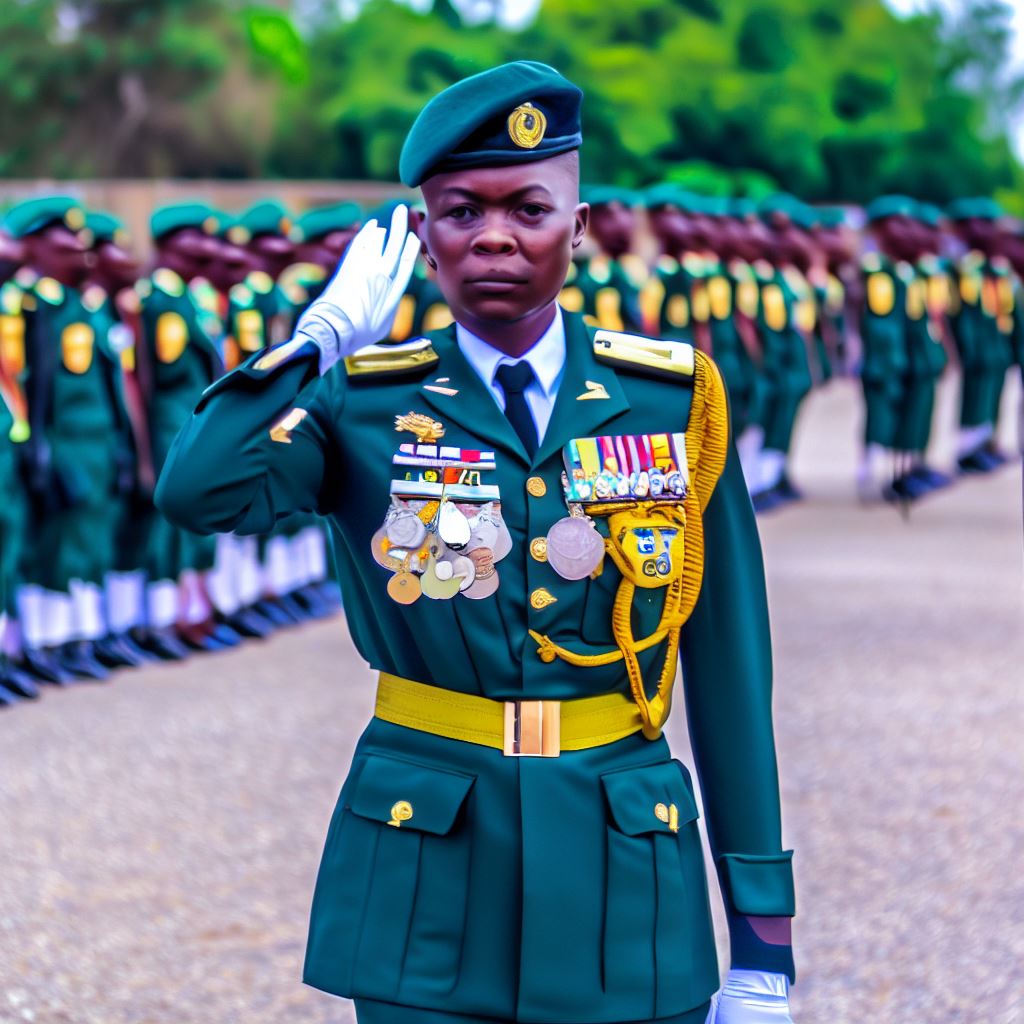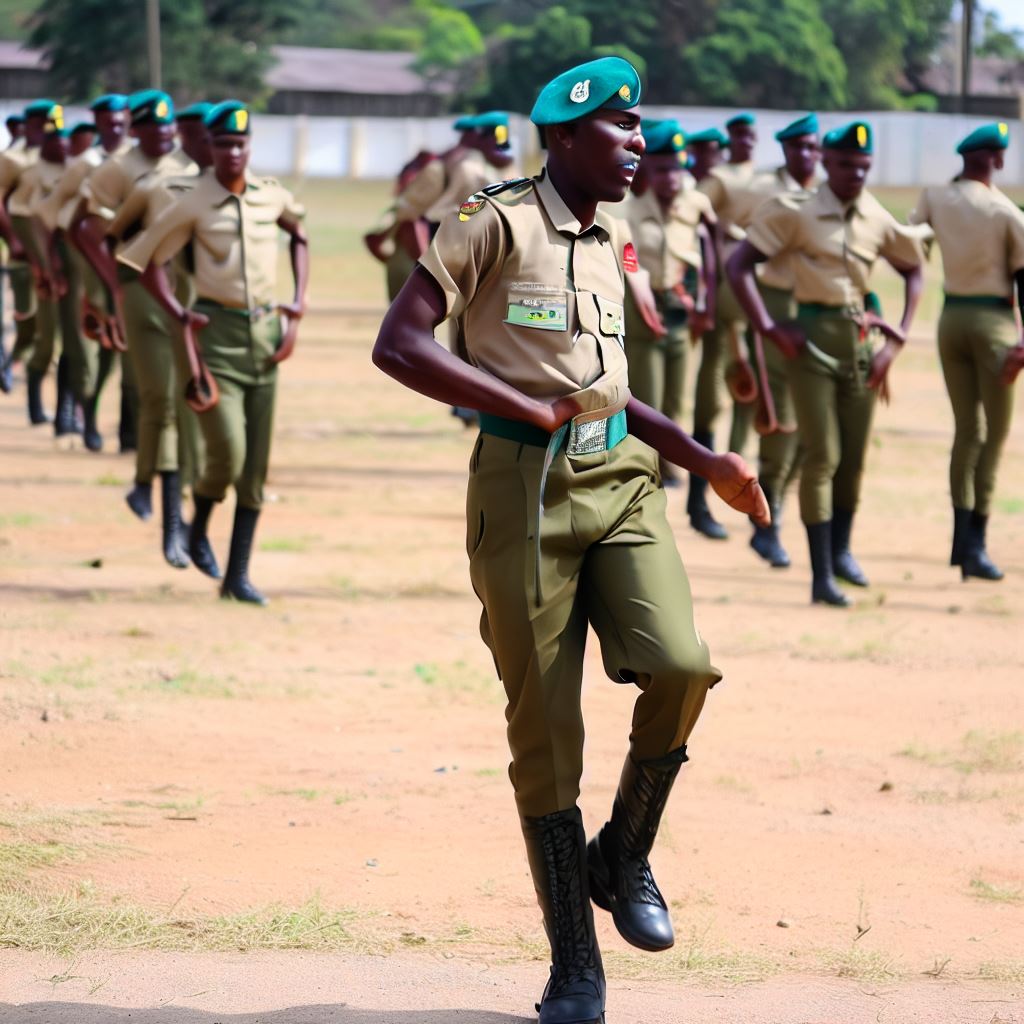Introduction
Military service in Nigeria is a topic that encompasses both benefits and challenges. It is an essential aspect of national security and defense.
Despite the inherent difficulties, serving in the military provides numerous advantages for individuals and the nation as a whole.
Nigeria, with its diverse population and geopolitical significance, faces various security threats. The military plays a vital role in protecting the country’s sovereignty and maintaining peace.
By defending the nation against external threats, military personnel ensure the safety and security of the Nigerian people.
Additionally, military service offers several benefits for individuals. It provides a stable and disciplined career path, offering opportunities for personal and professional growth.
Through training and education, soldiers acquire valuable skills that can be applied in both military and civilian settings. These skills include leadership, teamwork, problem-solving, and critical thinking.
Moreover, military service provides financial stability, with competitive salaries and various allowances. This ensures a decent standard of living for service members and their families.
The military also offers medical benefits, including healthcare coverage and access to specialized medical facilities.
While military service in Nigeria presents significant benefits, it also comes with challenges. The country faces the threat of insurgency, terrorism, and other forms of internal conflicts.
This puts military personnel in harm’s way and exposes them to physical and psychological risks.
Despite these challenges, military service in Nigeria is crucial for national development. The military plays an essential role in peacekeeping missions, both within the country and internationally.
Nigerian soldiers have contributed to peacekeeping efforts in various African countries, showcasing the nation’s commitment to regional stability.
Military service in Nigeria offers numerous benefits for individuals and the nation,While challenges exist, the military plays a crucial role in maintaining national security and peace.
By addressing these challenges and leveraging the benefits, Nigeria can continue to build a strong and capable military force.
Benefits of Military Service in Nigeria
In Nigeria, military service brings about numerous benefits for individuals who choose this career path and shows the different challenges surrounding it. This section will explore some of the key advantages associated with serving in the Nigerian military.
Skill Development
One of the major benefits of military service in Nigeria is skill development. Military personnel undergo extensive training and discipline, which are crucial in building their character and capabilities.
The training provided helps individuals enhance their leadership and teamwork skills, preparing them to effectively work in a team-based environment.
Additionally, military service offers opportunities to acquire technical skills, including engineering and logistics expertise, which can be advantageous in future career prospects.
Job Security and Stability
Job security and stability are also significant advantages of military service in Nigeria. Military personnel enjoy a stable income and various benefits.
This ensures financial security, especially considering the challenging economic conditions in the country.
Furthermore, being in the military provides access to pension and healthcare provisions, ensuring a safety net for retired military personnel.
The Nigerian military also offers opportunities for promotion and long-term career advancement, providing individuals with a sense of stability and a clear path for professional growth.
Educational Opportunities
Another notable benefit of military service in Nigeria is the availability of educational opportunities.
Military personnel have access to scholarships and vocational training programs, which can help them further their education and enhance their skills.
Post-service, military personnel can continue their education with the support of educational benefits specifically tailored for veterans.
This includes access to higher education institutions, enabling them to pursue advanced degrees and broaden their knowledge in various fields.
Military service in Nigeria presents several advantages for individuals who choose this path.
Skill development, including training, discipline, leadership, teamwork, and technical expertise, is a key benefit of military service.
Job security and stability, with stable income, benefits, and opportunities for promotion, provide a sense of security for military personnel.
Additionally, military service opens doors to educational opportunities, such as scholarships and post-service educational benefits.
Overall, military service in Nigeria offers a platform for personal and professional growth, with benefits that extend beyond one’s time in the military.
Read: Paths to Becoming a Military Officer in Nigeria

Challenges of Military Service in Nigeria
Security Risks
- Insurgency and terrorism threats pose significant challenges to military personnel in Nigeria.
The country has been grappling with various insurgent groups, such as Boko Haram, which have carried out numerous attacks, resulting in casualties among military personnel.
These threats require the military to be constantly vigilant and prepared to respond to attacks. - The risk of physical harm and combat-related injuries is ever-present in military service.
Military personnel face the dangers of combat operations, including the risk of getting injured or even losing their lives. This risk is heightened during conflict situations and counterinsurgency operations. - Military personnel often face psychological impacts due to their combat experiences.
Witnessing violence, being exposed to life-threatening situations, and losing comrades can lead to post-traumatic stress disorder (PTSD) and other mental health issues among military personnel.
These psychological challenges can have long-lasting effects on their well-being and ability to function effectively.
Separation from Family and Loved Ones
- Frequent deployments and long periods away from home create challenges for military personnel.
The nature of military service often requires personnel to be deployed to different locations for extended periods, leaving behind their families and loved ones.
This separation can strain relationships and impact the emotional well-being of both military personnel and their families. - Emotional challenges and strain on relationships are common among military personnel and their loved ones.
The constant separation, uncertainty, and stress associated with military service can lead to increased emotional distance, misunderstandings, and difficulty in maintaining strong bonds.
This strain can affect the mental health and overall quality of life for military families. - Maintaining a work-life balance becomes difficult for military personnel due to their demanding schedules.
The military often requires personnel to work long hours, including weekends and holidays, and be available for deployments and exercises.
This leaves little time for personal and family commitments, making it challenging to achieve a healthy work-life balance.
Inadequate Equipment and Resources
- Lack of modern equipment and technology hinders the effectiveness of the military in Nigeria.
The military often faces challenges in acquiring and maintaining state-of-the-art equipment, which can impact their ability to effectively carry out operations.
Outdated or insufficient equipment puts military personnel at a disadvantage when facing well-equipped adversaries. - Insufficient training facilities and infrastructure limit the readiness of military personnel.
Inadequate training facilities and infrastructure can hinder the training and professional development of military personnel.
Without proper resources for realistic and comprehensive training, military personnel might not be adequately prepared to handle real-life combat situations, compromising their effectiveness in the field. - Military personnel often have limited access to necessary resources and logistics, compromising their operations.
The lack of essential resources, such as fuel, ammunition, and medical supplies, can hinder military operations and put personnel at risk.
Limited access to logistics and transportation infrastructure can also impede the timely deployment and resupplying of troops in critical situations.
Overcoming Challenges and Promoting Success in Military Service
Military service in Nigeria is not without its challenges, but there are several strategies and approaches that can be implemented to overcome these obstacles and promote success in the armed forces.
Adequate Support Systems
To address the psychological well-being of military personnel, it is crucial to provide accessible psychological counseling and therapy services.
This will help them cope with the stress and trauma associated with military service.
Furthermore, family support programs and resources should be made available to military families.
These programs can include financial aid, education scholarships for children, and support networks to help families navigate the unique challenges they face.
Improving healthcare services and benefits for military personnel is also essential.
Access to quality healthcare, adequate medical facilities, and comprehensive benefits will ensure that the physical well-being of military personnel is not compromised.
Strengthening Infrastructure and Resources
Investing in modern equipment and technology is paramount for the Nigerian military.
By upgrading their arsenal, the armed forces can enhance their operational capabilities and effectively counter any security threats they may face.
Additionally, training facilities and infrastructure need to be upgraded to provide the best possible training for military personnel.
State-of-the-art facilities will ensure that soldiers are trained to perform their duties effectively and efficiently.
Collaborating with international partners can significantly support the Nigerian military.
This collaboration can involve sharing knowledge and expertise, receiving financial aid and technical assistance, and strengthening diplomatic ties.
Recognition and Appreciation
Enhancing public perception and appreciation for military personnel is crucial for their morale and motivation.
Public awareness campaigns should highlight the sacrifices and dedication of the armed forces in safeguarding national security.
Recognizing and rewarding exceptional service and contributions will further boost the morale of military personnel.
Instituting programs that acknowledge outstanding achievements and providing incentives for exemplary service will promote a culture of excellence within the military.
Encouraging public-private partnerships for veterans’ support programs is essential in providing long-term support for military personnel even after their service.
These partnerships can facilitate job placement programs, mentorship initiatives, and entrepreneurship opportunities for veterans.
Overcoming challenges and promoting success in military service in Nigeria requires the implementation of adequate support systems such as psychological counseling, family support programs, and improved healthcare services.
Strengthening infrastructure through investments in modern equipment, upgrading training facilities, and collaborating with international partners is also vital.
Additionally, recognizing and appreciating the efforts of military personnel and encouraging public-private partnerships for veterans’ support programs are essential for creating a conducive and supportive environment for military service in Nigeria.
Read: Military Officer Ranks in Nigeria: A Comprehensive List
Discover More: Retirement from the Military in Nigeria: What’s Next?
Conclusion
Military service in Nigeria brings both benefits and challenges. The benefits include increased discipline, patriotism, and skill development.
However, there are also challenges like inadequate funding and equipment, as well as the risk of violence and loss of life.
It is essential to recognize and address these challenges to ensure the effectiveness and well-being of military personnel.
Continuous improvement and support, including proper funding and equipment provision, are necessary.
Supporting the military is not only a duty but also a means to enhance national security and development. The role of military service in Nigeria cannot be understated.
It plays a significant part in protecting the country’s borders, maintaining peace, and safeguarding the nation against internal and external threats.
Therefore, it is vital for the government, organizations, and citizens to contribute to the overall improvement of military service in Nigeria.
By doing so, we can ensure the safety and welfare of our military personnel and secure a brighter future for our country.
Let us remain hopeful and optimistic about the future.
With continuous improvements in military service and the unwavering commitment of our courageous soldiers, Nigeria can overcome challenges and achieve greater security and prosperity for all its citizens.




